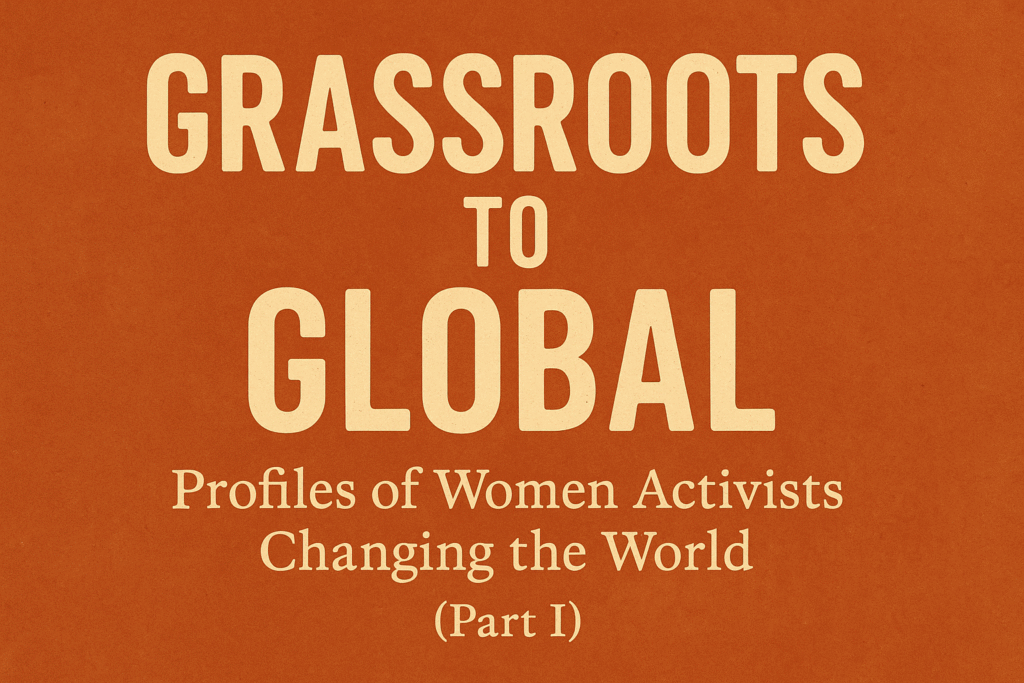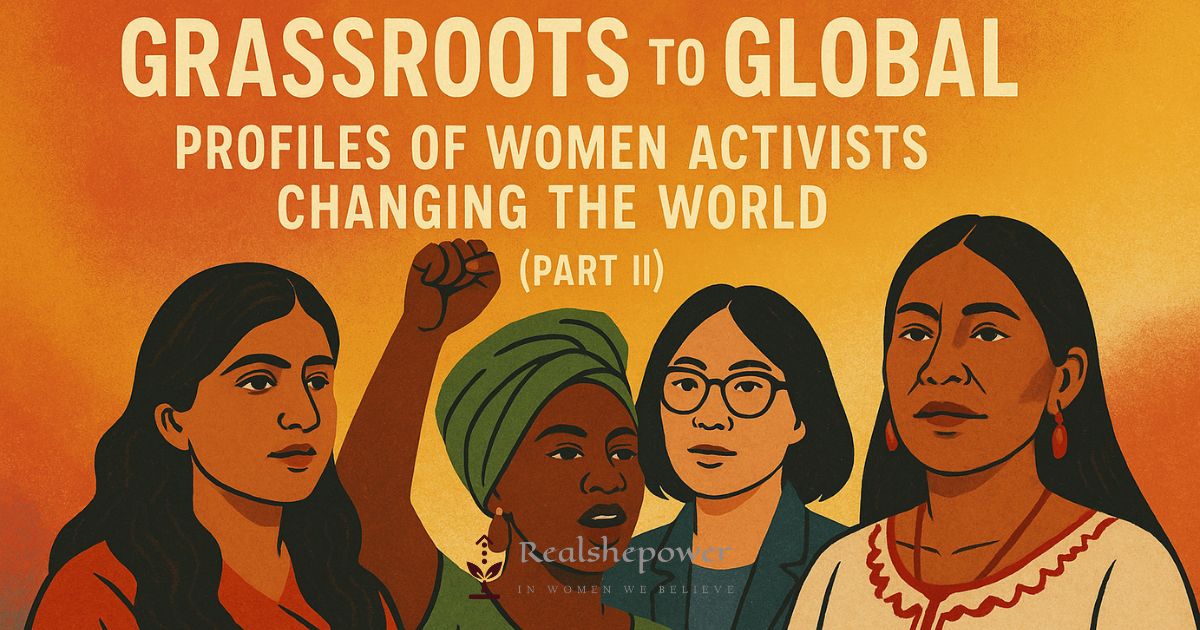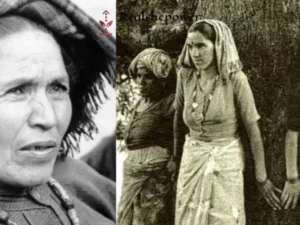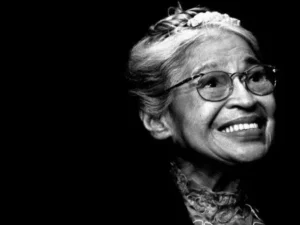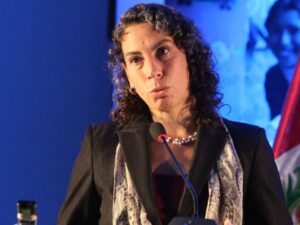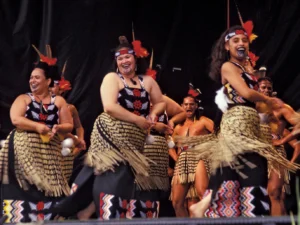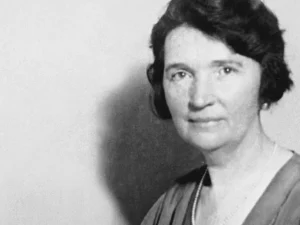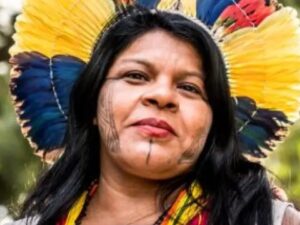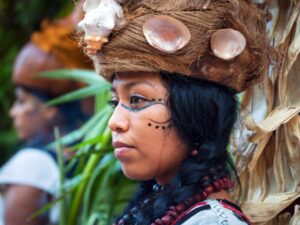Profiles of Women Activists Changing the World (Part II)
6. Vandana Shiva – Environmental Activist and Author
Vandana Shiva, an Indian environmental activist and author, has emerged as a globally recognized figure in the environmental movement, especially in the context of agriculture and food sovereignty. Her work has been pivotal in challenging corporate control of agriculture and advocating for sustainable farming practices, a journey that has had a profound impact on both environmental policy and grassroots movements.
Advocacy Against Corporate Control of Agriculture
Shiva’s activism is deeply rooted in her opposition to the dominance of multinational corporations in agriculture. She has been vocal in her criticism of genetically modified organisms (GMOs), patenting of seeds, and the use of harmful pesticides and fertilizers that not only damage the environment but also threaten the livelihoods and food security of small farmers. Shiva argues that such corporate-driven agricultural models promote monocultures, reduce biodiversity, and make farmers dependent on costly inputs and technologies.
Championing the Rights of Small Farmers
A significant aspect of Shiva’s work involves defending the rights and livelihoods of small farmers, especially in developing countries. She believes that these farmers, who are often marginalized in global agricultural policies, are crucial guardians of biodiversity and traditional agricultural knowledge. Shiva’s advocacy extends to ensuring that these farmers have fair access to markets, equitable land rights, and are not displaced by industrial farming practices.
Promoting Biodiversity Conservation
Biodiversity conservation is a cornerstone of Shiva’s environmental activism. She emphasizes the importance of preserving a variety of plant and animal species to maintain ecological balance and resilience. Her work in this area includes campaigning against the loss of native seeds and species due to the spread of industrial agriculture and genetically modified crops. Shiva advocates for seed sovereignty – the right of farmers to save, exchange, and control their seeds, which is critical for biodiversity conservation.
Protection of Indigenous Knowledge
Shiva has been a strong proponent of protecting indigenous knowledge, particularly knowledge related to agriculture and natural resource management. She argues that traditional practices, developed over centuries, are not only sustainable but also hold answers to some of the current environmental challenges. Her work involves documenting these practices and integrating indigenous wisdom with modern ecological principles.
Emphasis on Ecological Sustainability
Vandana Shiva’s vision of sustainable agriculture is one where ecological balance is maintained, and farming practices are in harmony with nature. She promotes organic farming, permaculture, and agroecology as sustainable alternatives to conventional, chemical-intensive farming. Shiva argues that such practices not only help in conserving the environment but also improve the health and well-being of communities.
Global Impact and Recognition
Shiva’s work has gained international recognition, bringing her numerous awards and honors. She has authored several books and articles, shedding light on the issues of environmental justice, sustainable agriculture, and the impact of globalization on small farmers. Her ideas have inspired a generation of environmental activists and are increasingly relevant in the context of climate change and global food security challenges.
Vandana Shiva’s relentless efforts to promote sustainable farming, protect biodiversity, and uphold the rights of small farmers continue to resonate globally, making her one of the most influential voices in the field of environmental activism. Her work highlights the urgency of rethinking our agricultural practices and policies to create a more equitable and sustainable future.
7. Rigoberta Menchú Tum – Indigenous Rights Activist and Nobel Laureate
Rigoberta Menchú Tum, a renowned Guatemalan indigenous rights activist, stands as a symbol of resilience and unwavering commitment to the fight for justice. Born on January 9, 1959, in the Quiché region of Guatemala, a predominantly indigenous area, she grew up experiencing the hardships and discrimination faced by her community. Her life’s journey, marked by personal tragedies and a relentless struggle for indigenous rights, has made her a global icon of social justice.
Early Life and Activism
Rigoberta Menchú Tum’s early life was shaped by the harsh realities of being part of the indigenous Quiché Maya community during a time of intense political turmoil in Guatemala. Her father, Vicente Menchú, was a community leader, and her mother, Juana Tum Kótoja, was a traditional healer and midwife. Growing up, Menchú Tum was deeply influenced by her parents’ activism and the injustices they faced.
Her family’s involvement in activism against the Guatemalan government, which was conducting a brutal campaign against indigenous communities, led to the tragic deaths of several of her family members, including her father, mother, and brother. These events deeply impacted Menchú Tum and propelled her further into political activism.
Struggle for Indigenous Rights
Rigoberta Menchú Tum’s activism focused on raising awareness about the plight of Guatemala’s indigenous population. She became an outspoken advocate for indigenous rights, emphasizing the need for land rights, cultural preservation, and an end to discrimination and violence against indigenous peoples. Her efforts were aimed at bringing international attention to the struggles faced by her community, including issues of poverty, racism, and state-sponsored oppression.
Nobel Peace Prize and International Recognition
In 1992, Rigoberta Menchú Tum’s relentless advocacy and tireless work in promoting social justice and reconciliation in Guatemala were recognized globally when she was awarded the Nobel Peace Prize. This accolade made her the first indigenous person and the first Guatemalan to receive this prestigious award. The Nobel Committee acknowledged her work in social justice and ethno-cultural reconciliation based on respect for the rights of indigenous peoples.
Legacy and Continuing Activism
Rigoberta Menchú Tum’s legacy extends far beyond her Nobel Peace Prize. She has continued her activism, using her platform to advocate for indigenous rights and social justice globally. She founded the Rigoberta Menchú Tum Foundation, dedicated to the promotion of indigenous rights and the pursuit of peace and political reconciliation in Guatemala.
Her efforts have inspired indigenous communities worldwide, serving as a beacon of hope and a powerful example of how perseverance and dedication to a cause can bring about change. Menchú Tum’s life story and activism have been instrumental in raising global awareness of the struggles faced by indigenous peoples and the importance of preserving their cultures and rights.
In conclusion, Rigoberta Menchú Tum’s journey from a humble background in the Guatemalan highlands to becoming an international symbol of peace and justice demonstrates her extraordinary resilience and commitment to her cause. Her ongoing activism continues to inspire and mobilize communities and individuals around the world to fight for social justice, equality, and the rights of indigenous peoples.
8. Aung San Suu Kyi – Democracy Activist and Nobel Laureate
Aung San Suu Kyi, a name synonymous with the struggle for democracy in Myanmar (formerly Burma), is a figure of global significance in the realm of political activism and human rights advocacy. Born on June 19, 1945, in Rangoon (now Yangon), Myanmar, Suu Kyi’s journey into the world of politics and activism was profoundly influenced by her father, Aung San, a revered figure in Burmese history and the architect of Myanmar’s independence from British rule.
Early Life and Education
Aung San Suu Kyi grew up experiencing firsthand the complexities of political upheaval and the quest for national identity. Her father’s assassination in 1947, when she was just two years old, left an indelible mark on her life. Suu Kyi pursued her education at the University of Delhi and later at the University of Oxford, where she studied politics, philosophy, and economics. These formative years laid the foundation for her deep understanding of democratic principles and human rights.
Return to Myanmar and Political Awakening
Suu Kyi’s return to Myanmar in 1988, initially to care for her ailing mother, coincided with a period of intense political turmoil in the country. The military junta’s harsh rule was met with widespread public discontent, culminating in the 8888 Uprising, a series of mass protests demanding democratic reforms. Suu Kyi, propelled by her sense of duty towards her homeland and inspired by the nonviolent philosophies of Mahatma Gandhi and Martin Luther King Jr., emerged as a leading voice in the pro-democracy movement.
Founding the National League for Democracy
In September 1988, Aung San Suu Kyi co-founded the National League for Democracy (NLD), a political party committed to nonviolence and civil disobedience. Despite the military junta’s brutal crackdown on dissent, the NLD rapidly gained popularity, with Suu Kyi as its charismatic figurehead. Her eloquent speeches, advocating for democratic freedoms and human rights, resonated with the aspirations of the Burmese people.
Years of House Arrest and Global Recognition
The military regime, feeling threatened by her growing influence, placed Aung San Suu Kyi under house arrest in 1989. Over the next two decades, she would spend approximately 15 years under detention, refusing offers for freedom in exchange for leaving the country. Her unwavering commitment to her cause and her dignified endurance of personal sacrifices garnered international acclaim. In 1991, she was awarded the Nobel Peace Prize for her nonviolent struggle for democracy and human rights. The Nobel Committee lauded her as “an outstanding example of the power of the powerless.”
Transition to Democracy and Controversies
Aung San Suu Kyi’s release in 2010 marked a significant turning point. The subsequent years saw gradual political reforms in Myanmar, leading to the NLD’s landslide victory in the 2015 general elections, with Suu Kyi becoming the State Counsellor, a position akin to a prime minister. However, her tenure in government has not been without controversy, particularly regarding the handling of the Rohingya crisis, which has tarnished her international image.
Legacy and Impact
Aung San Suu Kyi’s journey is a testament to the power of perseverance in the face of adversity and the importance of steadfastly upholding democratic values and human rights. Her story remains a powerful reminder of the ongoing struggles for democracy around the world and the sacrifices involved in the pursuit of political freedom and justice. Her complex legacy continues to evoke discussions on the challenges of leadership, the nuances of political morality, and the enduring quest for democracy.
9. Dolores Huerta – Labor and Civil Rights Activist
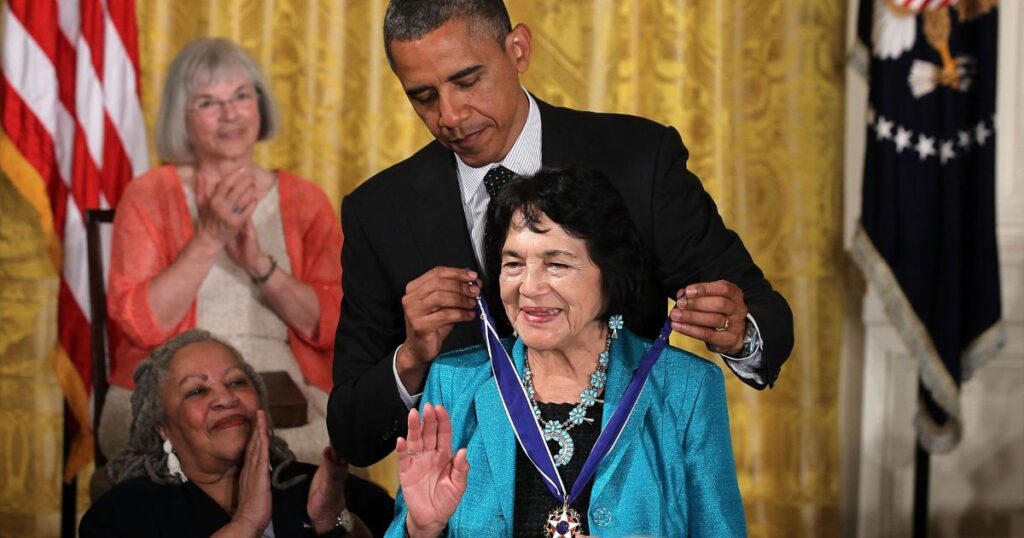
Dolores Huerta, an iconic figure in American history, is best known for her unyielding efforts as a labor and civil rights activist. Co-founding the National Farmworkers Association, which later became the United Farm Workers (UFW) with Cesar Chavez, Huerta has dedicated her life to the fight for the rights of some of the most vulnerable groups in society – farmworkers, immigrants, and women.
Early Life and Inspiration:
Born on April 10, 1930, in Dawson, New Mexico, Huerta grew up in a time of significant economic and social turmoil. Her early life experiences, including witnessing the struggles of farmworkers, played a crucial role in shaping her future activism. She was deeply influenced by her mother’s community spirit and business acumen, as well as her father’s involvement in union activism and local politics.
Role in the United Farm Workers:
As a co-founder of the National Farmworkers Association, Huerta was instrumental in bringing to light the dire conditions faced by farmworkers in the United States. Alongside Cesar Chavez, she worked tirelessly to organize laborers, leading to the creation of the UFW. Her role in negotiating the first successful collective bargaining agreement for farmworkers in 1966 marked a significant victory in labor rights history.
Advocacy for Farmworkers and Immigrants:
Huerta’s activism extended beyond labor rights. She was a strong advocate for broader social issues affecting farmworkers and immigrants, including health, education, and environmental justice. Her efforts contributed to the passage of the 1975 California Agricultural Labor Relations Act, which allowed farmworkers the right to organize and bargain for better wages and working conditions.
Women’s Rights and Empowerment:
Beyond her work with farmworkers, Huerta has been a vocal proponent of women’s rights. She challenged gender discrimination within the labor movement and worked to promote women’s leadership. Huerta’s message of empowerment resonated with many, encouraging women to take active roles in their communities and fight for their rights.
Continued Influence and Legacy:
Dolores Huerta’s legacy is not confined to the past; she continues to be a formidable force in advocating for social and economic justice. Her work has inspired generations of activists to fight for equitable treatment and rights for all. She has received numerous awards and honors, including the Presidential Medal of Freedom in 2012, recognizing her lifelong dedication to advocacy and social justice.
Impact on Future Generations:
Huerta’s influence extends beyond her immediate achievements. She has become a symbol of resilience and hope, especially for marginalized communities. Her life’s work demonstrates the power of collective action and the importance of steadfast commitment to a cause.
In conclusion, Dolores Huerta’s contributions to labor rights, civil rights, and women’s empowerment have been monumental. Her relentless activism and leadership have led to substantial improvements in the lives of many and continue to inspire those committed to the pursuit of social and economic justice.
10. Ellen Johnson Sirleaf – First Female President of Liberia and Nobel Laureate
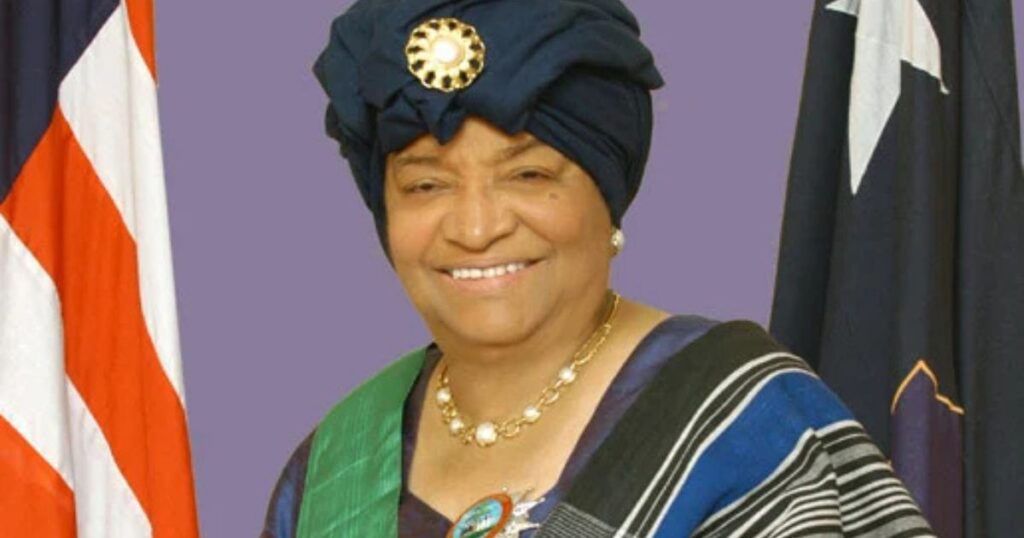
“Ellen Johnson Sirleaf: Breaking Barriers as Africa’s First Female President”
Ellen Johnson Sirleaf’s journey to becoming Africa’s first female president is a story of resilience, courage, and groundbreaking achievement. Born in Liberia, Sirleaf’s early life was marked by a passion for education and public service. With a background in economics and public administration, she was well-equipped to take on leadership roles. However, her path to the presidency was not smooth; it was fraught with challenges that reflected the turbulent political landscape of Liberia.
In 2005, against a backdrop of a nation ravaged by civil war, Sirleaf emerged as a beacon of hope for Liberia. Her election as president was not just a personal victory but a historic moment for the continent. It shattered long-standing gender barriers in African politics, setting a precedent for women’s leadership.
During her presidency, Sirleaf’s primary focus was on rebuilding Liberia from the ashes of conflict. She inherited a country deeply scarred by years of civil war, with a decimated infrastructure and a population traumatized and impoverished. Sirleaf’s approach was multifaceted: she sought international partnerships and aid, worked on rebuilding the nation’s critical infrastructure, and initiated programs aimed at healing and reconciliation among Liberians.
A staunch advocate for women’s rights, Sirleaf’s leadership was instrumental in promoting gender equality in Liberia. She understood the unique challenges faced by women in post-conflict settings and was committed to ensuring that women were not just beneficiaries of the peace process, but active participants in it. Under her administration, efforts were made to increase women’s presence in political and public spheres, and to address issues like gender-based violence.
Sirleaf’s fight against corruption was another cornerstone of her presidency. Recognizing that corruption had been one of the root causes of Liberia’s historical problems, she took significant steps to combat it, though these efforts were met with varying degrees of success and criticism.
The international community recognized Sirleaf’s efforts in 2011 when she was awarded the Nobel Peace Prize. The prize acknowledged her nonviolent struggle for the safety of women and for women’s rights to full participation in peace-building work. This accolade was not just a recognition of Sirleaf’s work but also a testament to the importance of having women in leadership roles, especially in conflict-affected regions.
Ellen Johnson Sirleaf’s presidency goes beyond her political achievements. It serves as an enduring symbol of the transformative power of women in leadership. Her legacy continues to inspire women across Africa and the world, proving that with resilience and determination, barriers can be broken, and new paths can be forged for future generations.
Grassroots to Global: Profiles of Women Activists Changing the World (Part I)
